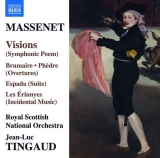 Jules Massenet: Brumaire (Ouvertüre) + Visions (Symphonische Dichtung), Suite Espada + Bühnenmusik Les Erinnyes + Phèdre (Ouvertüre); Royal Scottish National Orchestra, Jean-Luc Tingaud; 1 CD Naxos 8.574178; Aufnahmen 08/2019, Veröffentlichung 10/2020 (75'05) - Rezension von Remy Franck
Jules Massenet: Brumaire (Ouvertüre) + Visions (Symphonische Dichtung), Suite Espada + Bühnenmusik Les Erinnyes + Phèdre (Ouvertüre); Royal Scottish National Orchestra, Jean-Luc Tingaud; 1 CD Naxos 8.574178; Aufnahmen 08/2019, Veröffentlichung 10/2020 (75'05) - Rezension von Remy Franck
Nach seiner herausragenden Franck-CD bei Naxos (Rezension) wendet sich Jean-Luc Tingaud der Orchestermusik des Opernkomponisten Jules Massenet (1842-1912) zu. Die an Liszt erinnernde Tondichtung Visions entwickelt viel dramatische Kraft und endet ätherisch mit einem Sopransolo.
Massenets drittes Ballett Espada spielt in Spanien. Nachdem er das Mädchen das ihn liebt zurückgewiesen hat, kommt der Toreador Alvear im Stierkampf ums Leben. Aus der dramatischen Musik hat der Komponist eine vierteilige Orchestersuite zusammengestellt, die Tingaud schwungvoll und leidenschaftlich dirigiert.
Les Érinnyes (Die Furien) ist eine Bühnenmusik für das gleichnamige Drama von Leconte de Lisle im Stil einer griechischen Tragödie mit den beiden Akten Klytämnestra und Orest. Die zweite Nummer heißt Invocation und zeigt Elektra am Grab von Agamemnon und ist eine auch separat veröffentliche Élégie für Cello und Orchester. Die sechsteilige Bühnenmusik wird in dieser Aufnahme sehr vital und farbig aufgeführt und auch die abschließend gespielte Ouvertüre Phèdre kommt in einer dramatischen Interpretation gut herüber.
Insgesamt ist das Programm aber nicht gerade umwerfend, und neben Invocation kann bestenfalls Espada bleibende Eindrücke hinterlassen.
After his outstanding Franck-CD on Naxos (review) Jean-Luc Tingaud turns his attention to the orchestral music of the opera composer Jules Massenet (1842-1912). The tone poem Visions, reminiscent of Liszt, develops a great deal of dramatic power and ends ethereally with a soprano solo.
Massenet’s third ballet Espada takes place in Spain. After he has rejected the girl who loves him, the toreador Alvear is killed in a bullfight. From the dramatic music, the composer has put together a four-part orchestral suite that Tingaud conducts with verve and passion.
Les Érinnyes (The Furies) is a stage music for the drama of the same name by Leconte de Lisle in the style of a Greek tragedy with the two acts Clytemnestra and Orest. The second piece is called Invocation and shows Elektra at the tomb of Agamemnon. It is an also separately published Élégie for cello and orchestra. The performance is vital and colourful, as is the Overture Phèdre.
All in all, however, the programme is not exactly dazzling, and apart from Invocation, at best Visions can leave lasting impressions.
























